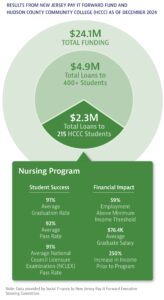Key Highlights
Challenges
Even when tuition costs are fully or partially paid through financial aid grants, working adults still face financial barriers to enrollment in education and training programs that can prepare them to fill in-demand jobs. When prospective students cannot afford to cover living costs while also paying education-related costs beyond tuition, they must often choose between forgoing a lucrative career path or taking on significant high-interest personal debt.
Opportunities
New Jersey’s Pay It Forward program is an outcomes-based financing model that is designed to remove financial barriers to enrollment in and completion of high-quality training by providing zero-interest loans as a “last dollar” solution to financial gaps, after first applying all other available grants and scholarship funding to cover their education costs. The program also offers wraparound services and living stipends free of charge.
NJ PIF stretches funding – which comes from a mix of public and private dollars – by reinvesting loan repayments to train more students than would be possible through grants alone, creating a “pay-it-forward” effect that scales impact.
The program supports students enrolled in certain high-demand, occupation-specific courses of study in public colleges — with an initial focus on the health care sector. The outcomes-based loan model ties repayments to graduates’ earnings gains.

Takeaways and Next Steps
- In its first two years, NJ PIF funded 400+ students, one-third of whom are already repaying their loans.
- 95% of students use the program’s living stipends and emergency grants, showing the critical value of this support for low- and moderate-income individuals.
- The program shows that evidence-based program design and cross-agency collaboration increase impact and accountability.
- The NJ PIF is an innovative financing mechanism for increasing the pipeline of trained workers, helping employers gain access to skilled talent in critical fields and enabling workers to benefit from affordable financing and supportive services that remove debt anxiety, improve outcomes, and open a path to the middle class.


